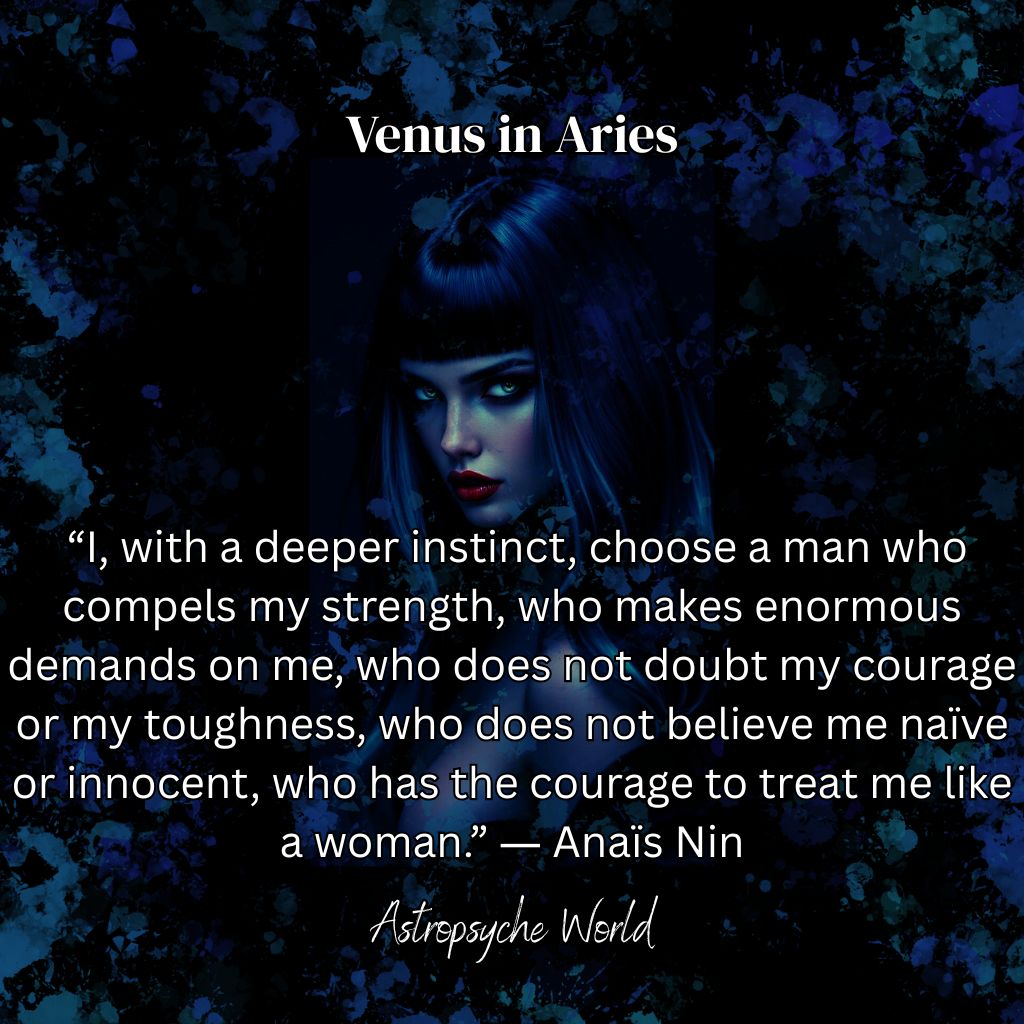
-
Lina - Astropsyche World
-
January 22, 2026
-
Astrology Insight

Venus in Aries is an archetype that exposes the conflict between the need for connection and the instinctive need for dominance and self-assertion. Symbolically, this is Venus losing her natural terrain — moving from the realm of receptivity, aesthetics, and harmony into Mars’ territory. Love is no longer an act of recognition, but an act of conquest.
In psychological language, this is the aspect where the feminine principle (Eros) is expressed through the masculine principle (Logos and action). Jung would say this activates the animus — the inner masculine of the feminine psyche, becoming the bridge between desire and action. A woman with this placement doesn’t wait to be chosen — she chooses. Her dynamic carries directness, magnetism, and often tension, because the need to stay in control coexists with the need to be seen and loved.
The paradox of this Venus is that although she seems like someone who could conquer many, she truly loves only once. Most often, it is someone who awakens in her the sense of being met — not to break her, but to contain her. Or it is the one she can never fully conquer, which keeps the flame alive indefinitely. This tension between strength and resistance creates the deepest eros of her life. Even if the love ends, it remains imprinted in her as the only real one, the measure of everything that comes after.
Here, eros is tied to impulse, not permanence. Attraction is born through movement, speed, and resistance. This Venus reacts with her body before she understands the emotion. Desire arrives as a surge of energy — immediate, pure, unfiltered. Once she conquers, she often loses interest because the act of conquest has fulfilled an internal need for validation, not necessarily the need for closeness.
On a deeper level, this is a battle between vulnerability and self-protection. The Mars instinct is used to defend Venus’ center — the place of softness, belonging, and tenderness. Instead of receiving, she gives. Instead of waiting, she initiates. And so she enters a loop: every passion becomes a proving ground, every love an arena in which she must survive.
The psychological task of Venus in Aries is not to extinguish her fire, but to learn how to direct it. To understand that eros doesn’t need to burn everything to be real. The lesson comes through the ability to slow down, to translate action-energy into presence. This means allowing herself to remain in the space between desire and reaction, without the immediate need to act.
The Shadow of Venus in Aries
The shadow of this placement emerges when impulse becomes a weapon against her own need for closeness. In the shadow, Venus in Aries cannot receive love — she can only conquer it. The relationship becomes proof of power, not a space for exchange. The partner becomes a projection of her inner animus: someone she must overpower, or someone who must be “worthy.”
When the shadow is active, the role of tenderness becomes distorted. Instead of softening, she becomes cold — consciously or unconsciously, rejecting anything that could make her vulnerable. Love becomes proof of strength, and passion becomes a method of controlling what cannot be admitted: the fear of losing control, the fear of rejection, the fear of total surrender.
At the core of this Venus lies a wound connected to early emotional autonomy — often a prematurely formed independence. She learned not to ask, because asking means dependence. Not to wait, because waiting means powerlessness. That wound later becomes a pattern: “I must be strong so I won’t be hurt.”
In partnership, this creates a dynamic of combat. The partner is experienced as a rival or a test. If he is weaker, she loses interest; if he is stronger, conflict arises. Love becomes an arena of ego, while tenderness remains suppressed.
The process of integrating this shadow is not about suppressing the impulse, but becoming conscious of it. Jung would say — what doesn’t become conscious returns as fate. Venus in Aries must learn that eros is not a loss of power, but an expansion of it. Receiving love is not weakness, but presence.
When she realizes that strength and softness can coexist, her impulse stops being a defense and becomes a gift. Then love is no longer a battle for control — but the conscious tending of a fire that warms, rather than burns.
Written by Lina Astropsyche World